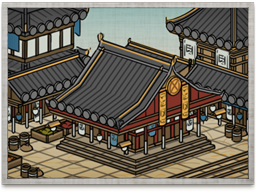Difference between revisions of "Kabunakama (TWS2)"
m |
m |
||
| Line 1: | Line 1: | ||
{{TWS2 Building|image=[[Image:Kanabukama S2TW.png]] | {{TWS2 Building|image=[[Image:Kanabukama S2TW.png]] | ||
| − | |Chain=Market Type | + | |Chain=[[:Category:TWS2_Building#Market_Chain|Market Type]] |
|Requires='''Buildings''':<li>[[Merchant Guild (TWS2)|Merchant Guild]]</li>'''Arts''':<li>[[Kinza Mint]]</li>'''Resources''':<li>Crafts</li> | |Requires='''Buildings''':<li>[[Merchant Guild (TWS2)|Merchant Guild]]</li>'''Arts''':<li>[[Kinza Mint]]</li>'''Resources''':<li>Crafts</li> | ||
|Enables=- | |Enables=- | ||
| Line 12: | Line 12: | ||
==Description== | ==Description== | ||
| − | + | '''To price everything is to value nothing.''' | |
| − | + | This is a merchants’ association or mutual trading company, where the powerful manage trade both for themselves and others. The kabunakama even controls the trade activities of smaller merchants’ guilds, can set prices on goods, and can even bar dishonest or immoral merchants from trade altogether. The kabunakama does not exist to promote competition among merchants, but cooperation and, as a result, it boosts a province’s wealth and growth enormously and also improves the quality of metsuke who are recruited as agents. | |
| − | + | Historically, kabunakama had much in common with the merchant adventurers and great trading companies of Europe. Often, they were granted trade rights in a town or over a particular commodity, but were then expected to pay substantial taxes to the shogun or daimyo for the privilege. Selling monopoly rights was something that all ruling classes did, as it was profitable and did not involve nobles in any of the sordid money-grubbing of common trade. Merchants did not, however, trade overseas with foreigners, except in very carefully controlled ways. Despite their enormous wealth, the merchants of the kabunakama did not improve their social status: as trading townsmen they were still far lower in the social pecking order than honest, hardworking peasant folk. | |
==Additional Bonuses== | ==Additional Bonuses== | ||
Revision as of 15:59, 4 November 2012
| Kabunakama (TWS2) | |
|---|---|
 | |
| Chain | Market Type |
| Requires | Buildings: |
| Enables | - |
| Spawned Defence Forces | - |
| Basic Building Statistics | |
| Clan Effects | |
| See main article; FotS Buildings | |
Description
To price everything is to value nothing.
This is a merchants’ association or mutual trading company, where the powerful manage trade both for themselves and others. The kabunakama even controls the trade activities of smaller merchants’ guilds, can set prices on goods, and can even bar dishonest or immoral merchants from trade altogether. The kabunakama does not exist to promote competition among merchants, but cooperation and, as a result, it boosts a province’s wealth and growth enormously and also improves the quality of metsuke who are recruited as agents.
Historically, kabunakama had much in common with the merchant adventurers and great trading companies of Europe. Often, they were granted trade rights in a town or over a particular commodity, but were then expected to pay substantial taxes to the shogun or daimyo for the privilege. Selling monopoly rights was something that all ruling classes did, as it was profitable and did not involve nobles in any of the sordid money-grubbing of common trade. Merchants did not, however, trade overseas with foreigners, except in very carefully controlled ways. Despite their enormous wealth, the merchants of the kabunakama did not improve their social status: as trading townsmen they were still far lower in the social pecking order than honest, hardworking peasant folk.
Additional Bonuses
If the player is first to construct this building type then he gets:
- +5% to the success chance of metsuke actions.